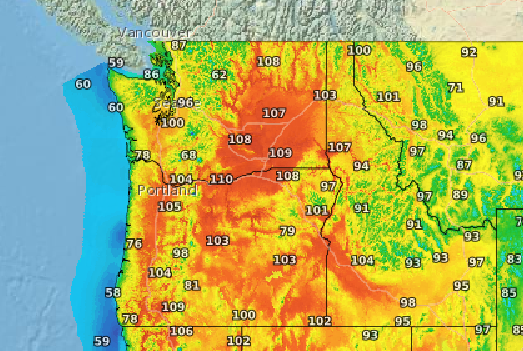
High temps could be killer as heatwave continues in the Northwest
Listen
(Runtime :46)
Read
High temperatures can be deadly, causing heat stroke or even leading to heart attacks and kidney failure.
“Heat related deaths are the number one weather killer in the United States,” said Colby Goatley, a meteorologist for the National Weather Service.”We like to emphasize to everyone, make sure you’re taking the heat seriously.”
In the U.S., more than 1,200 people die of extreme heat each year, according to the Centers for Disease Control and Prevention.
The Northwest heatwave continues this week. Regions of eastern Washington and northern Idaho will reach 108 and 106 degrees, respectively, or even hotter.
“Midweek is going to be when we see our hottest temperatures in the triple digits, possibly even reaching 110,” Goatley said. “After that we do start to see some cooling, although we will still be seeing temperatures in the 90s and 100s.”
Meteorologists have been meeting with city and county officials across the Northwest to make sure everyone is planning for the heat, Goatley said.
“With the recent high temperatures, we continue to encourage residents in our region to prioritize safety and conservation,” said Richland Mayor Theresa Richardson. “Stay hydrated, seek shade, check on your neighbors and consider ways to conserve energy to ease strain on our resources.”
There are tools to help keep Northwest residents up to date on which areas are most at risk for high heat.
Forecasts for temperatures are constantly updated on the National Weather Service website. The HeatRisk map from the National Weather Service shows temperatures for both day and night, how unusual the heat is for the time of year and if there is an elevated heat risk based on data from the CDC, Goatley said.
If you’re working outside, Goatley said to take long breaks, drink lots of water and try to stay in the shade.
“Try to limit your exposure outside as much as possible,” he said.
Vulnerable populations like children, the elderly, pets and people without air conditioning are especially at risk, Goatley said.















